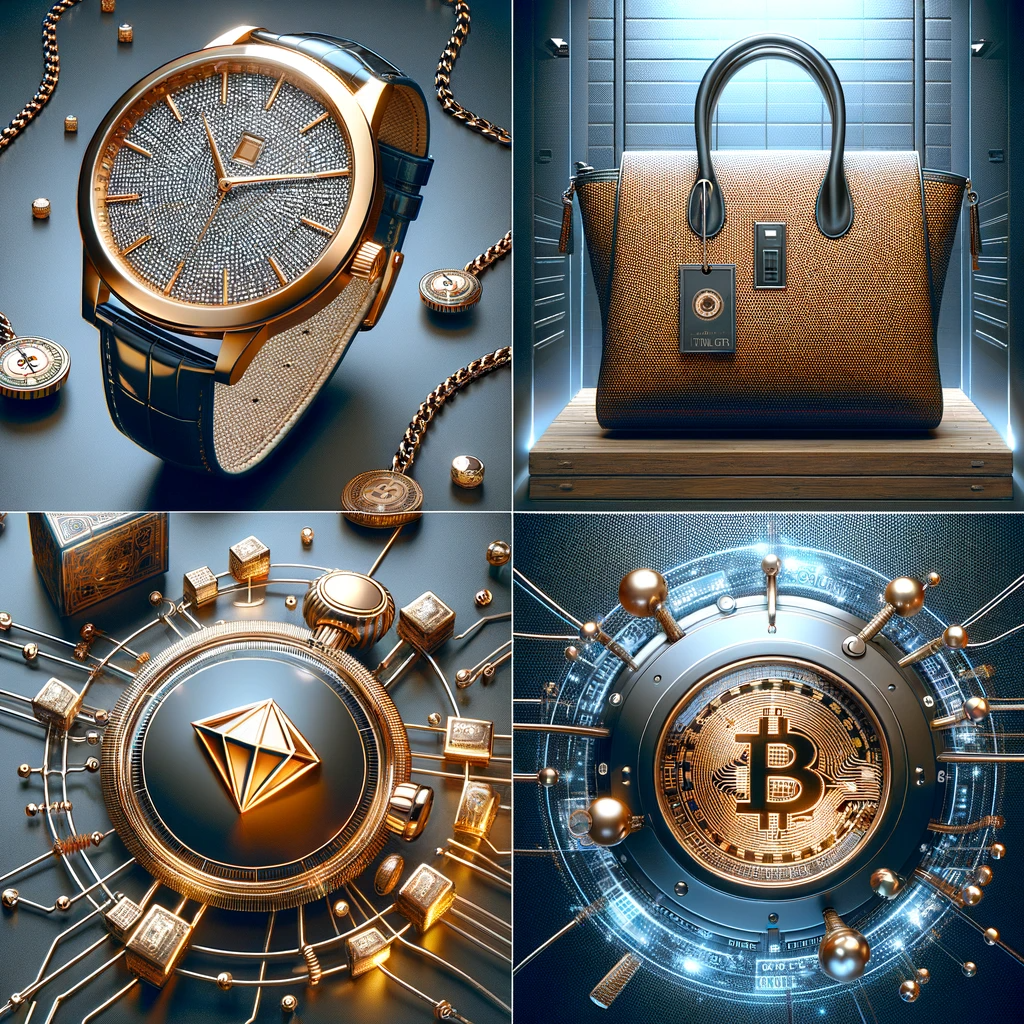Luxury Redefined: Blockchain’s Pivotal Role in High-End Goods Trading
The intersection of blockchain technology and luxury goods trading is a burgeoning area that offers numerous benefits and exciting possibilities. Here are some attractive images of luxury goods in Figure 1 that visually encapsulate the integration of blockchain technology with luxury goods trading. Each image represents a key aspect of this synergy, highlighting elements such as authenticity, traceability, transparency, and security. These images complement the themes discussed in the blog, illustrating how blockchain is enhancing the luxury goods market.

Here’s a blog exploring this innovative fusion:
Introduction to Blockchain and Luxury Goods Trading
Blockchain technology, known for its pivotal role in cryptocurrencies, is now making waves in the luxury goods industry. Its core attributes – transparency, security, and traceability – align perfectly with the needs of the luxury market, where authenticity and provenance are paramount.
Ensuring Authenticity and Provenance
One of the biggest challenges in the luxury goods market is the prevalence of counterfeits. Blockchain’s immutable ledger provides a foolproof system for verifying the authenticity of luxury items. Each item can be tagged with a unique digital identifier, which, when recorded on a blockchain, tracks its journey from the manufacturer to the end consumer. This not only assures the buyer of the item’s authenticity but also enhances its value by providing a clear history.
Enhancing Customer Trust
In the luxury market, trust is a crucial commodity. Blockchain fosters trust by providing a transparent and unalterable record of the item’s history, including previous ownership, maintenance, and authenticity. This transparency is incredibly appealing to buyers in a market that is often shrouded in mystery and skepticism.
Streamlining Supply Chain Management
Blockchain can greatly streamline supply chain processes in the luxury goods market. By using smart contracts, transactions can be automated and made more efficient, reducing costs and the potential for human error. This leads to a more robust and responsive supply chain, capable of delivering luxury goods more swiftly and securely.
Personalized and Secure Transactions
Blockchain can offer a more personalized buying experience. Luxury goods buyers often value privacy, and blockchain transactions can offer this, along with the assurance of security. This personalization extends to after-sales services and warranties, which can be securely managed and transferred if needed.
Investment and Resale Markets
Blockchain opens up new possibilities in the investment and resale of luxury items. With a clear record of an item’s history and authenticity, it becomes easier to resell luxury goods, potentially increasing their resale value. It also makes luxury goods more attractive as investment pieces.
Sustainability and Ethics in Luxury Goods
Increasingly, consumers are concerned about the sustainability and ethical production of their purchases. Blockchain can help luxury brands provide proof of ethical sourcing and sustainable practices, enhancing brand reputation and meeting consumer demand for responsible luxury.
Conclusion
Blockchain technology is set to revolutionize the trading of luxury goods. It offers a combination of security, transparency, and efficiency that addresses many of the current challenges in the luxury goods market. As this technology continues to evolve, it will undoubtedly open up new opportunities and redefine the trading of luxury items.